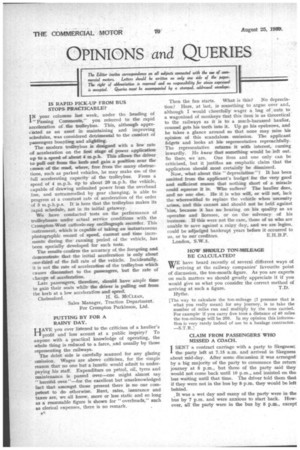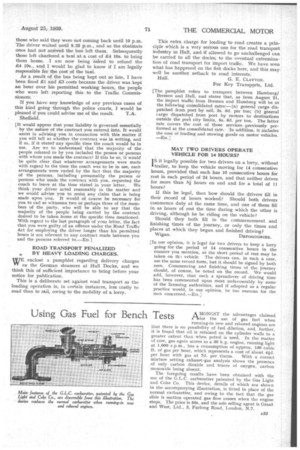OPINIONS and QUERIES
Page 42

Page 43

If you've noticed an error in this article please click here to report it so we can fix it.
The Editor invites correspondence on all subjects connected with the use of com mercial motors. Letters should be written on only one side of the paper. The right of abbreviation is reserved and no responsibility for views expressed
LS accepted. Queries must be accompanied by a stamped, addressed envelope.
IS RAPID PICK-UP FROM BUS STOPS PRACTICABLE?
IN your columns last week, under the heading of I" Passing Comments," you referred to the rapid acceleration of .the trolleybus. This, although appreciated as an asset in maintaining and improving schedules, was considered detrimental to the comfort of passengers boarding and alighting.
The modern trolleybus is designed with a low rate of acceleration on the first stage of power application up to a. speed. of about 4 m.p.h. This allows the driver' to pullE otit from. the kerb. and gain a position near the crown of the road, where, free from the many obstructions, such as parked vehicles, he may make use of the full accelerating capacity of the trolleybus. From a speed of 4 m.p.h. up to about 20 m.p.h. the vehicle, capable of drawing unlimited power from the overhead line, and untrammelled by gear changing, is able to progress at a constant rate of acceleration of the order of 3 rup.h.p.s. It is here that the trolleybus makes its rapid schedule, not in its initial getaway. We have conducted tests on the performance of trolleybuses under actual serVice conditions with the Crompton-West cathode-ray oscillograph. recorder. This instrument, which is capable of taking an instantaneous photographic record of speed, current and time increments during the running period of the vehicle, has been specially developed for such tests.
The results confirm the accuracy of, the foregoing and demonstrate that the initial acceleration is onlyabout one-third of the full rate of the vehicle. Incidentally, . it is not the rate of acceleration of the trolleybus which causes discomfort to the passengers, but the rate of changeof acceleration.
Late passengers, therefore, should have ample time to gain their seats while the driver ispulling out from the kerb at a low acceleration and speed.
Chelmsford. H. G. MCCLEA.N, Sales Manager, Traction Department. For Crompton Parkinson, Ltd.
PUTTING BY FOR A RAINY DAY.
HAVEyou ever listened to the criticism of a haulier's profit and loss acount at a public inquiry? To anyone with a practical knowledge of operating, the whole thing is reduced to a farce, and usually by those representing the railways.
The debit side is carefully scanned for any glaring omission. Wages are above criticism, for the simple reason that no one but a lunatic would admit to underpaying his staff. Expenditure on petrol, oil, tyres and maintena-nce is passed over—one might almost say " hurried over "—for the excellent but unacknowledged fact that amongst those present there is no one competent to do otherwise. Rent, rates, insurance and taxes are, we all know, more or less static and so long as a reasonable figure is shown for "overheads," such as clerical expenses, there is no remark. Then the fun starts. What is this No deprecia
tion? Here, at last, is something to argue over and, although I would cheerfully wager a bag of nuts to a wagonload of monkeys that this item is as theoretical to the railways as it is to a much-harassed haulier, counsel gets his teeth into it. Up go his eyebrows, and he takes a glance around so that none may miss his opinion of this scandalous omission. The applicant fidgets and looks at his representative reproachfully. The representative returns it with interest, cursing inwardly. He knew that something would be left out. So there, we *are. One item and one only can be criticized, but it justifies an emphatic claim that the application should most certainly be dismissed.
Now, what about this " depreciation "? It has been omitted from the applicant's budget for the very good and sufficient reason that nothing short of a miracle could squeeze: it in. Who suffers? The haulier does, and no one else. He it is who will; or will not, lack the wherewithal to replace the vehicle when necessity arises, and this cannot and should not be held against 'him, because it has no bearing on his quality as an operator and licensee, or on the solvency of his business. If this were not the case, those of us who are unable to save against a rainy day, and we are legion, could be adjudged bankrupt years before it occurred to us, or to our creditors. E. H. B. P London, S.W.1.
HOW SHOULD TON-MILEAGE BE CALCULATED?
WE have heard recently of several different ways of
arriving at the railway companies' favourite point of discussion, the ton-month figure. As you are experts on such matters we should greatly appreciate it if you would give us what you consider the correct method of arriving at such a figure. T.D. Hythe. .
[The way to calculate the ton-mileage (I presume that is what you really mean). for any journey, is to take the number of miles run and' multiply by the tons carried. For example if you carry five tons a distance of 40 miles, the ton-mileage will be 200. In my opinion this information is very rarely indeed of use to a haulage contractor. —S.T.R.] CLAIM FROM PASSENGERS WHO MISSED A COACH.
I SENT a contract carriage with a party to Skegness; the party left at 7.15 a.m, and arrived in Skegness about mid-day. After some discussion it was arranged by a big majority of the party to commence the return journey at 8 p.m., but three of the party said they would not come back until 10 p.m., and insisted on the bus waiting until that time. The driver told them that if they were not in the bus by 8 p.m. they would be left behind.
It was a wet day and many of the party were in the bus by 7 p.m. and were anxious to start back. However, all the party were in the bus by 8 p.m., except
those who said they were not coming back until 10 p.m. The driver waited until 8.25 p.m., and as the obstinate ones had not arrived the bus left them. Subsequently those left chartered a taxi at a cost of £4 10s. to bring them home. I am now being asked to refund the £4 10s., and I would be glad to know if I am legally responsible for the cost of the taxi.
As a result of the bus being kept out so late. I have been fined £1 and £3 costs because the driver was kept an hour over his permitted working hours, the people who were left reporting this , to the Traffic Commissioners.
If you have any knowledge of any previous cases of this kind going through the police courts, I would be pleased if you could advise me of the result. T.A. Sheffield.
[It would appear that your liability is governed essentially by the nature of the contract you entered into. It would assist in advising you in connection with this matter if you will tell us whether the contract was in writing, and if so, if it stated any specific time the coach would be in use. Are we to understand that the majority of the people referred to by you included the person or persons with whom you made the contract? If this be so, it would be quite clear that whatever arrangements were made with regard to the time the coach was to be in use, such arrangements were varied by the fact that the majority of the persons, including presumably the person or persons who made the contract with you, requested the
coach to leave at the time stated in your letter. We think your driver acted reasonably in the matter and we would advise you to resist any claim that is being made upon you. It would of course be necessary for you to tail as witnesses two or perhaps three of the members of the party, who will be able to say that the majority of the people being carried by the contract desired to be taken home at the specific time mentioned. With regard to the last paragraph of your letter, the fact that you were guilty of an offence under the Road Traffic Act for employing the driver longer than his permitted hours is not relevant to any contract made between you and the persons referred to.—ED.]
ROAD TRANSPORT PENALIZED BY HEAVY LOADING CHARGES.
4fr WE enclose a pamphlet regarding delivery charges TT ex the German steamers at Hull Docks, and we think this of sufficient importance to bring before your notice for publication.
This is a deliberate set against road transport as the loading operation is, in certain instances, less costly to road than to rail, owing to the mobility of a lorry.
This extra charge for loading to road creates a principle which is a very serious one for the road transport industry in Hull, and if allowed to go unchallenged can be carried to all the docks, to the eventual extermination of road transport for import traffic. We have seen what has happened on the fish docks here, and this may well be another setback to road interests.
Hull. G. E. CLAYTON.
For Key Transports, Ltd.
[The pamphlet refers to transport between Hamburg/ Bremen and Hull, and states that, as from August 21, the import traffic from Bremen and Hamburg will be at the following consolidated rates:—(a) general cargo dispatched from port by rail, 3s. 8d. per ton; (b) general cargo dispatched from port by motors to destinations outside the port city limits, 5s. 6d. per ton. The latter rate covers the cost of those services previously performed at the consolidated rate. In addition, it includes the cost of loading and stowing goods on motor vehicles. —ED.]
MAY TWO DRIVERS OPERATE VEHICLE FOR 14 HOURS?
I S it legally possible for two drivers on a lorry, without trailer, to keep the vehicle moving for 14 consecutive hours, provided that each has 10 consecutive hours for rest in each period of 24 hours, and that neither drives for more than 54 hours on end and for a total of 11 hours?
If this be legal, then how should the drivers fill in their record of hours worked? Should both drivers commence duty at the same time, and one of them fill in as hours of rest the time during which the other is driving, although he be riding on the vehicle?
Should they both fill in the commencement and finishing times of the journey, or only the times and places at which they began and finished driving?
Wigan. DEPOSITORIES,
[In our opinion, it is legal for two drivers to keep a lorry going for the period of 14 consecutive hours in the manner you mention, as the short period of rest may be taken on thl vehicle The drivers can, in such a case, use the same record form, but it should be signed by both men. Commencing and finishing times of the journey should, of course, be noted on the record. We would add, however, that such a spreadover of driving time has been commented upon most unfavourably by some of the licensing authorities, and if adopted as a regular practice would, in our opinion, be too onerous for the men concerned.—ED.]












































































